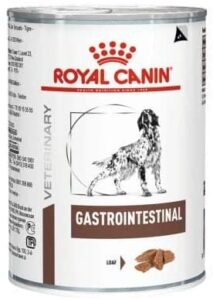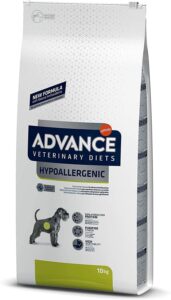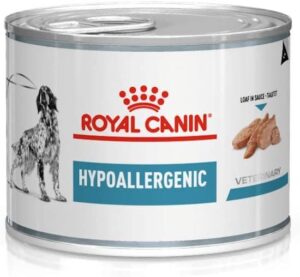When your dog has a sensitive stomach, you want to do everything you can to make sure he’s comfortable, and a big part of that is making sure he has the right food.
But if your dog has a sensitive stomach, what kind of food does he need, what ingredients should he be aware of, and what are the best foods for dogs with sensitive stomachs on the market?

What are the main causes of sensitive stomachs in dogs?
First things first: Before we move on to the ingredients to look for in dog foods with sensitive stomachs, let’s talk about the different reasons why your dog may have sensitive stomach problems in the first place.

Sudden changes in diet can lead to serious stomach problems in dogs, so for example, if you run out of your usual brand of food and replace it with another, there could be some chaos in your dog’s digestive system. The sudden change in fat content or protein type when moving from one food to another can disrupt your dog’s gastrointestinal system.
But if you can’t relate it to a diet change — or if your dog’s stomach sensitivity is more chronic — it could be a sign of a more pressing health problem, as in the case of dogs with more serious gastrointestinal disorders, such as inflammatory bowel disease (IBD), pancreatitis or food allergies.
What are the best ingredients for dogs with sensitive stomachs?
If your dog has a sensitive stomach, a mild ingredient may be better.

Depending on the underlying cause of the sensitive stomach, we usually recommend soft, easy-to-digest protein and carbohydrate sources, such as chicken, turkey breast or boneless white fish, rice, pasta, whole grains, and probiotics (fiber) to support colon health and promote healthy gut flora.
Adding probiotics to the mix can also help soothe your dog’s stomach problems. Supplementing your dog’s diet with a high-quality probiotic can help many dogs with sensitive stomachs.
Are foods formulated for dogs with sensitive stomachs healthy for my pet?

If your dog has stomach problems, switching to a food specifically formulated for sensitive stomachs can help him manage them.
Dogs that have exhibited gastrointestinal symptoms or have recurrent gastrointestinal symptoms may benefit from a dog food formulated for a sensitive gut.
Keep in mind that if your dog has more serious gastrointestinal problems, he may need a diet prescribed by the veterinarian to feel better. This is especially important if your dog’s stomach sensitivity problems are caused by allergies.
There is an important difference between dogs with stomach sensitivity and dogs with true food allergies.

Dogs with food allergies need a specially formulated diet that is completely hypoallergenic, or what we call a “novel” protein source, such as duck or rabbit, to which the dog’s immune system does not react.
Do you help us share?

Dog care

How to keep your dog from barking at delivery drivers

How to measure a dog for a harness

Furbo Dog Camera

Which dog is smarter?

Home remedies for shedding hair in dogs
- Why do dogs bury bones? - January 2, 2023
- How long is a dog’s pregnancy? - December 24, 2022
- Why do dogs mark territory? - October 24, 2022
